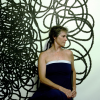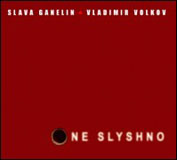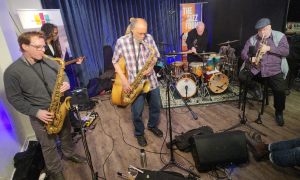Home » Jazz Articles » Live Review » Taking a Magical Mastery Tour with The Bill Frisell Trio...
Taking a Magical Mastery Tour with The Bill Frisell Trio in Northampton, Massachusetts
What the band created balanced on an edge distinguishing revolutionary from mainstream.
Iron Horse Music Hall
Northampton, Massachusetts
June 21, 2007
Flourishing in something produces ecstasy. No experience can equal the satisfaction of a temporally bound creative act for which no result can be predicted and which simply becomes increasingly surprising as it evolves. The conversation that a musician can have internally with an instrument as well as with bandmates strengthens the possibility for an outcome more positive than was ever anticipated. The Bill Frisell Trio, performing at the Iron Horse Music Hall in Northampton, pulled it all together on this first day of summer.
Longtime associates Kenny Wollesen on drums and Tony Scherr on acoustic bass joined Frisell on his electric guitar for a performance that outdid all audience expectations. It was a night of transformation. As the summer evening twilight turned to darkness, the music metamorphosed along with it.
The band began gradually. Wolleson rattled the drumsticks from the center of the stage, Scherr played a single-finger pizzicato from stage right and, from stage left, Frisell sculpted the guitar line, interacting with his digital hook-up. The sound grew. The involvement of the three musicians thickened. Frisell plucked an unquestionably pure Frisell line. And then, with a breath-long hiatus and a shift from a high to a significantly lower pitch, the music fell into a melodic-rhythmic fantasia. Every detail that Frisell worked out with his fingering deepened the well of sonic intrigue. The band was off and running.
The borders between abstraction and familiarity were narrow, but with Frisell's lead the trio mapped a joy ride. The music was whimsical and untarnished with heaviness just like the leader's sensibilities. The first piece of the set culminated in an array of stopping and starting similar to the dynamic of a game like freeze- tag. "Shenandoah was recognizable from the outset in the second number. Frisell's tone was pure, its quality inimitable. But that song evolved into "Little Surfer Girl out of a set of taut reverberations implying that two guitars could have been playing. At a point where the digital sampling and the guitar overlapped in their congruence, "Just Like A Woman arrived and, with it, a dispersed sound like fifty guitars were on stage. The sound waves radiated incessantly as the melody progressed, Frisell saying so much with so little physical movement. The session concluded formally with "When You Wish Upon a Star, which evolved into a down-home tune from his quintessential recording, Nashville (Nonesuch, 1997). With the simplicity of repeated motions through ascending and descending scales, Frisell conveyed a mastery with the strokes of his magical hands.
Frisell bent pitches: he suspended the connections between one phrase and the next by altering the rhythm and teasing with intonation possibilities. Chord clusters frequented the vast number of ornamentations and electronically processed effects. More often than not, the guitar line floated above the clear-cut wave of sound that was being generated. Sometimes, when Frisell repeated chords, it was almost as if the instrument were whistling. When Frisell hit a stream of ostinatos, the effect was all but mind-blowing. The guitarist's attentions seemed focused exclusively on how he would construct musical time, while engaging Scherr and Wolleson along with his digital machine as his playmates.
Tony Scherr's playing demonstrated that he has matched Frisell's musical personality to a tee. His command of his instrument depended on what Frisell was doing: he carefully watched every move Frisell made, addressing the bass broadly, his uninhibited body motion anthropomorphizing the abstract sounds as he swayed his instrument to a steep angle while playing it. His pizzicati were executed with one finger with a full arm stroke or with many busy fingers actively sustaining the rhythmic background for the primary melody or improvisation. His occasional evocation of the blues penetrated and overrode the general flow to reinstill it with earthliness.
The drums diversified the texture of the soundscape. Wolleson, while keeping his approach open, was straight-forward and steady, bolstering the spirit of the songs that the band unwound. The drummer was equally responsive to the call for large and small gestures. He counteracted the rippling fluidity of the guitar with tight raps to the snare skin or clinched an improvisatory notion by nailing a hard, high-volume groove, bass drum and all. He would go out of tempo, then revive the regular flow without hesitation. He answered to the bass; he answered to the guitar. He responded to the swell of the moments.
The members of the trio often went in three directions but always returned to a strong mutual musical plan to regroup and focus on melodic expansion. Frisell was the inspiration for the trio's coherence, no matter how disjointed the music seemed at times. What the band created balanced on an edge distinguishing revolutionary from mainstream. This daring spirit spoke from the souls of adventurers fearless in combining the coldly unpredictable with the warmly comforting. The result was beautiful to behold.
Tags
PREVIOUS / NEXT
Bill Frisell Concerts
Support All About Jazz
 All About Jazz has been a pillar of jazz since 1995, championing it as an art form and, more importantly, supporting the musicians who make it. Our enduring commitment has made "AAJ" one of the most culturally important websites of its kind, read by hundreds of thousands of fans, musicians and industry figures every month.
All About Jazz has been a pillar of jazz since 1995, championing it as an art form and, more importantly, supporting the musicians who make it. Our enduring commitment has made "AAJ" one of the most culturally important websites of its kind, read by hundreds of thousands of fans, musicians and industry figures every month.

























